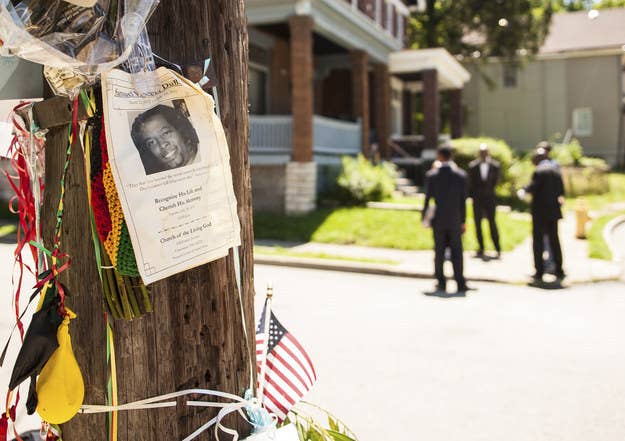
CINCINNATI — Fikko wasn't too surprised when he heard that a University of Cincinnati police officer shot and killed an unarmed black man. He'd grown up in Cincinnati and had always lived close to the school. He'd been stopped by UCPD officers many times — "harassed," as he put it. His four friends with him on Thursday afternoon — the day after the county prosecutor announced Officer Ray Tensing had been indicted on murder charges for killing Samuel DuBose during a traffic stop — weren't surprised either.
"I knew it was only a matter of time," said Fikko, who is 30 and requested that BuzzFeed News only use his nickname. "You gotta understand, we more shook by college campus police officers than the Cincinnati police."
The young men were gathered, some of them shirtless in the summer heat, at a park a few blocks from where DuBose, 43, was killed, less than half a mile south of the university's main campus. And yet, they said, it felt so much further away. Here, most people were black and many were poor. There, most people were white and many came from rich families.
"And so it's like they want to keep us away, make sure we stay where they want us to stay," Fikko said.
While Fikko and his friends recalled stories of UCPD harassment that stretched back at least a decade, they agreed that things had become heated in recent years. Both these young men and four current UC students told BuzzFeed News that UCPD's relationship with the surrounding community further deteriorated in October 2013, when University of Cincinnati President Santa Ono, along with Cincinnati Police Chief Jeffrey Blackwell, wrote a letter calling on local judges to "send a clear, forceful, and reverberating message to criminals and the broader community that the predatory targeting of UC students will have severe consequences."
"What it did was tell students, your lives are more valuable than theirs," said Cierra Carter, a junior at the university. "The purpose was, 'We're gonna scare the shit out of the community, and anybody that commits a crime we want punished really, really, really bad.'"
The letter had come in response to a spate of robberies of students in the blocks surrounding the campus. One local television news station noted that "some students are actually arming themselves to be safe."
In a separate message to students that same month, Ono noted that he was increasing the frequency of UC's off-duty officer patrols from four days a week to seven, and increasing the number of officers assigned to off-duty patrol detail from eight to thirteen. UCPD would also increase patrols "within targeted areas of concern." A multi-jurisdictional agreement among the county, the university, and local municipalities grants UCPD authority to stop, question, or arrest people off campus. (The university did not respond to a request for comment as of press time.)
"This effort to enhance and expand a visible police presence," Ono said in the letter, "will continue for the foreseeable future."
A few weeks later, a judge handed down the maximum 11-year sentence to two men convicted of robbing somebody near the campus. "It appears as though the criminal element in Cincinnati is preying on the students and working people near and on the campus of UC," Common Pleas Court Judge Ralph Winkler said at the sentencing hearing.
To some students, the administration's campaign had widened the already thick line between the campus, which is 7% black, and the community surrounding it in a city that is 45% black.
"Instead of inclusion, there's this culture of class that UC has created," said Alex Shelton, a senior who runs UC Students Against Injustice. "It's like the people in the outside communities are voiceless to the administration and the administration just wants them to stay out of the way."
The administration's directive, Shelton and the other students said, seemed to affirm and inflame preconceived worries some incoming students had about the city.
"There's this outside perception that Cincinnati is very dangerous," said Carter. During a campus tour she took at the school four years ago, she said, the guide touted UCPD's off-campus presence.
The UC students who spoke with BuzzFeed News believed that the October 2013 crackdown sparked an increase in aggression that led to DuBose's fatal traffic stop on July 19. Officer Tensing had pulled DuBose over because he didn't have a front license plate. Within two minutes, Tensing shot DuBose in the head at close range. He claimed that DuBose accelerated and dragged him, but his body camera showed that he fired right after DuBose turned on his ignition.
Fikko and his friends had been following the story closely. On this July afternoon, the men gathered around one young man's phone reading a news story reporting that Tensing had been arraigned, his bail set at $1 million.
"I'm glad they had that shit on video," Fikko said. "Could've been one of us."
